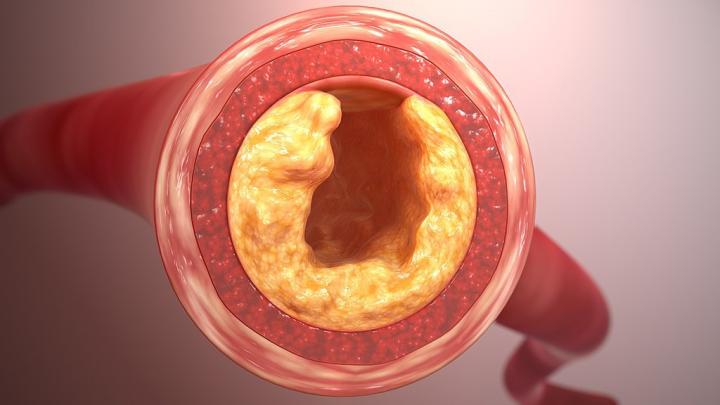New findings suggest low levels of HDL cholesterol are the most common kind of lipid disorder in Latin America and the Caribbean

Credit: Image credit: Scientific Animations, Girish Khera (CC BY-SA 4.0)
Low levels of HDL cholesterol, the so-called ‘good’ cholesterol, are the most common lipid disorder in countries in Latin America and the Caribbean, a new meta-analysis published in eLife shows.
Cholesterol levels in the blood can be important indicators of heart health or cardiovascular disease. By providing regional insights on cholesterol patterns, the study may help local public health leaders develop new strategies to reduce rates of cardiovascular disease by improving cholesterol levels in their communities.
Tracking cholesterol data in Europe, North America, Australia and New Zealand has helped guide initiatives that have delayed the onset of heart disease. Monitoring rising cholesterol levels in Asia and the Pacific is helping clinicians in those regions test strategies to curb this trend. But limited population-level data have been available to guide heart health initiatives in Latin America and the Caribbean. “We wanted to find out which kind of lipid disorder is most common in these two regions,” says lead author Rodrigo M. Carrillo-Larco, a Wellcome Trust International Training Fellow at the School of Public Health, Imperial College London, UK, and Research Associate at CRONICAS Centre of Excellence in Chronic Diseases, Universidad Peruana Cayetano Heredia, Peru.
Carrillo-Larco and colleagues based in Peru analysed data from 197 studies between 1964 and 2016 that collected information on blood cholesterol and lipid levels from individuals in Latin America and the Caribbean. Their results showed no substantial changes in blood cholesterol or lipid levels in these areas over time. “Since 2005, the most common lipid disorder in this region has been low HDL cholesterol, followed by high triglycerides and high LDL cholesterol,” Carrillo-Larco explains.
Their analysis provides a starting point for researchers to track cholesterol and lipid levels in these populations by collecting the data during routine visits, or by conducting large studies that follow thousands of individuals over time.
“Our results also suggest that efforts to boost levels of HDL cholesterol may provide the greatest heart health benefits to people living in these regions,” concludes senior author Antonio Bernabe-Ortiz, Research Associate at the CRONICAS Center of Excellence in Chronic Disease, Universidad Peruana Cayetano Heredia, Peru. “Such efforts could include public health campaigns to increase physical activity by improving walking infrastructure, or to reduce rates of diabetes or obesity by promoting access to healthy foods.”
###
Reference
The paper ‘A systematic review of population-based studies on lipid profiles in Latin America and the Caribbean’ can be freely accessed online at https:/
Media contact
Emily Packer, Media Relations Manager
eLife
[email protected]
01223 855373
About eLife
eLife is a non-profit organisation created by funders and led by researchers. Our mission is to accelerate discovery by operating a platform for research communication that encourages and recognises the most responsible behaviours. We work across three major areas: publishing, technology and research culture. We aim to publish work of the highest standards and importance in all areas of biology and medicine, including Epidemiology and Global Health, while exploring creative new ways to improve how research is assessed and published. We also invest in open-source technology innovation to modernise the infrastructure for science publishing and improve online tools for sharing, using and interacting with new results. eLife receives financial support and strategic guidance from the Howard Hughes Medical Institute, the Knut and Alice Wallenberg Foundation, the Max Planck Society and Wellcome. Learn more at https:/
To read the latest Epidemiology and Global Health Research published in eLife, visit https:/
Media Contact
Emily Packer
[email protected]
Original Source
https:/
Related Journal Article
http://dx.




